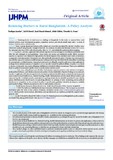| dc.identifier.citation | Joarder, T., Rawal, L. B., Ahmed, S. M., Uddin, A., & Evans, T. G. (2018). Retaining doctors in rural bangladesh: A policy analysis. International Journal of Health Policy and Management, 7(9), 847-858. doi:10.15171/ijhpm.2018.37 | en_US |
| dc.description.abstract | Background
Retaining doctors in rural areas is a challenge in Bangladesh. In this study, we analyzed three rural retention policies: career development programs, compulsory services, and schools outside major cities – in terms of context, contents, actors, and processes.
Methods
Series of group discussions between policy-makers and researchers prompted the selection of policy areas, which were analyzed using the policy triangle framework. We conducted document and literature reviews (1971-2013), key informant interviews (KIIs) with relevant policy elites (n = 11), and stakeholder analysis/position-mapping.
Results
In policy-1, we found, applicants with relevant expertise were not leveraged in recruitment, promotions were often late and contingent on post-graduation. Career tracks were porous and unplanned: people without necessary expertise or experience were deployed to high positions by lateral migration from unrelated career tracks or ministries, as opposed to vertical promotion. Promotions were often politically motivated. In policy-2, females were not ensured to stay with their spouse in rural areas, health bureaucrats working at district and sub-district levels relaxed their monitoring for personal gain or political pressure. Impractical rural posts were allegedly created to graft money from applicants in exchange for recruitment assurance. Compulsory service was often waived for political affiliates. In policy-3, we found an absence of clear policy documents obligating establishment of medical colleges in rural areas. These were established based on political consideration (public sector) or profit motives (private sector).
Conclusion
Four cross-cutting themes were identified: lack of proper systems or policies, vested interest or corruption, undue political influence, and imbalanced power and position of some stakeholders. Based on findings, we recommend, in policy-1, applicants with relevant expertise to be recruited; recruitment should be quick, customized, and transparent; career tracks (General Health Service, Medical Teaching, Health Administration) must be clearly defined, distinct, and respected. In policy-2, facilities must be ensured prior to postings, female doctors should be prioritized to stay with the spouse, field bureaucrats should receive non-practising allowance in exchange of strict monitoring, and no political interference in compulsory service is assured. In policy-3, specific policy guidelines should be developed to establish rural medical colleges. Political commitment is a key to rural retention of doctors. | en_US |

